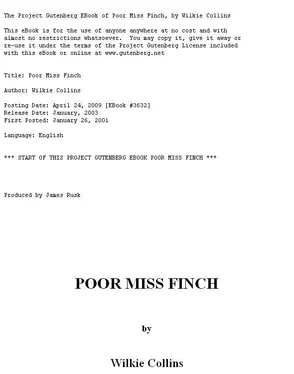Уилки Коллинз - Poor Miss Finch
Здесь есть возможность читать онлайн «Уилки Коллинз - Poor Miss Finch» весь текст электронной книги совершенно бесплатно (целиком полную версию без сокращений). В некоторых случаях можно слушать аудио, скачать через торрент в формате fb2 и присутствует краткое содержание. Год выпуска: 2002, Жанр: Классическая проза, на английском языке. Описание произведения, (предисловие) а так же отзывы посетителей доступны на портале библиотеки ЛибКат.
- Название:Poor Miss Finch
- Автор:
- Жанр:
- Год:2002
- ISBN:нет данных
- Рейтинг книги:3 / 5. Голосов: 1
-
Избранное:Добавить в избранное
- Отзывы:
-
Ваша оценка:
- 60
- 1
- 2
- 3
- 4
- 5
Poor Miss Finch: краткое содержание, описание и аннотация
Предлагаем к чтению аннотацию, описание, краткое содержание или предисловие (зависит от того, что написал сам автор книги «Poor Miss Finch»). Если вы не нашли необходимую информацию о книге — напишите в комментариях, мы постараемся отыскать её.
Poor Miss Finch — читать онлайн бесплатно полную книгу (весь текст) целиком
Ниже представлен текст книги, разбитый по страницам. Система сохранения места последней прочитанной страницы, позволяет с удобством читать онлайн бесплатно книгу «Poor Miss Finch», без необходимости каждый раз заново искать на чём Вы остановились. Поставьте закладку, и сможете в любой момент перейти на страницу, на которой закончили чтение.
Интервал:
Закладка:
The sound of Nugent's voice helped her to calculate her distance from him without assistance from me. Still holding my arm, she stopped and spoke to him.
"Nugent," she said, "I have made Oscar tell me—what he ought to have told me long since." (She paused between each sentence; painfully controlling herself, painfully catching her breath.) "He has discovered a foolish antipathy of mine. I don't know how; I tried to keep it a secret from him. I need not tell you what it is."
She made a longer pause at those words, holding me closer and closer to her; struggling more and more painfully against the irresistible nervous loathing that had got possession of her.
He listened, on his side, with the constraint which always fell upon him in her presence more marked than ever. His eyes were on the ground. He seemed reluctant even to look at her.
"I think I understand," she went on, "why Oscar was unwilling to tell me——" she stopped, at a loss how to express herself without running the risk of hurting his feelings—"to tell me," she resumed, "what it is in you which is not like other people. He was afraid my stupid weakness might prejudice me against you. I wish to say that I won't let it do that. I never was more ashamed of it than now. I, too, have my misfortune. I ought to sympathize with you, instead of——"
Her voice had been growing fainter and fainter as she proceeded. She leaned against me heavily. One glance at her told me that if I let it go on any longer she would fall into a swoon. "Tell your brother that we have gone back to the rectory," I said to Nugent. He looked up at Lucilla for the first time.
"You are right," he answered. "Take her home." He repeated the sign by which he had already hinted to me to be silent—and joined Oscar at the wall in front of the house.
"Has he gone?" she asked.
"He has gone."
The moisture stood thick on her forehead. I passed my handkerchief over her face, and turned her towards the wind.
"Are you better now?"
"Yes."
"Can you walk home?"
"Easily."
I put her arm in mine. After advancing with me a few steps, she suddenly stopped—with a blind apprehension, as it seemed, of something in front of her. She lifted her little walking-cane, and moved it slowly backwards and forwards in the empty air, with the action of some one who is clearing away an encumbrance to a free advance—say the action of a person walking in a thick wood, and pushing aside the lower twigs and branches that intercept the way.
"What are you about?" I asked.
"Clearing the air," she answered. "The air is full of him. I am in a forest of hovering figures, with faces of black-blue. Give me your arm. Come through!"
"Lucilla!"
"Don't be angry with me. I am coming to my senses again. Nobody knows what folly, what madness it is, better than I do. I have a will of my own: suffer as I may, I promise to break myself of it this time. I can't, and won't let Oscar's brother see that he is an object of horror to me." She stopped once more, and gave me a little propitiatory kiss. "Blame my blindness, dear, don't blame me. If I could only see—! Ah, how can I make you understand me, you who don't live in the dark?" She went on a few paces, silent and thoughtful—and then spoke again. "You won't laugh at me, if I say something?"
"You know I won't."
"Suppose yourself to be in bed at night."
"Yes?"
"I have heard people say that they have sometimes woke in the middle of the night, on a sudden, without any noise to disturb them. And they have fancied (without anything particular to justify it) that there was something, or somebody, in the dark room. Has that ever happened to you?"
"Certainly, my love.—It has happened to most people to fancy what you say, when their nerves are a little out of order."
"Very well. There is my fancy, and there are my nerves. When it happened to you, what did you do?"
"I struck a light, and satisfied myself that I was wrong."
"Suppose yourself without candle or matches, in a night without end, left alone with your fancy in the dark. There you have Me! It would not be easy, would it, to satisfy yourself; if you were in that helpless condition? You might suffer under it—very unreasonably—and yet very keenly for all that." She lifted her little cane, with a sad smile. "You might be almost as great a fool as poor Lucilla, and clear the air before you with this!"
The charm of her voice and her manner, added to the touching simplicity, the pathetic truth of those words. She made me realize, as I had never realized before, what it is to have, at one and the same time, the blessing of imagination, and the curse of blindness. For a moment, I was absorbed in my admiration and my love for her. For a moment, I forgot the terrible position in which we were all placed. She unconsciously recalled it to me when she spoke next.
"Perhaps I was wrong to force the truth out of Oscar?" she said, putting her arm again in mine, and walking on. "I might have reconciled myself to his brother, if I had never known what his brother was like. And yet I felt there was something strange in him, without being told, and without knowing what it was. There must have been a reason in me for the dislike that I felt for him from the first."
Those words appeared to me to indicate the state of mind which had led to Lucilla's deplorable mistake. I cautiously put some questions to her to test the correctness of my own idea.
"You spoke just now of forcing the truth out of Oscar," I said, "What made you suspect that he was concealing the truth from you?"
"He was so strangely embarrassed and confused," she answered. "Anybody in my place would have suspected him of concealing the truth."
So far the answer was conclusive.
"And how came you to find out what the truth really was?" I asked next.
"I guessed at it," she replied, "from something he said in referring to his brother. You know that I took a fanciful dislike to Nugent Dubourg before he came to Dimchurch?"
"Yes."
"And you remember that my prejudice against him was confirmed, on the first day when I passed my hand over his face to compare it with his brother's."
"I remember."
"Well—while Oscar was rambling and contradicting himself—he said something (a mere trifle) which suggested to me that the person with the blue face must be his brother. There was the explanation that I had sought for in vain—the explanation of my persistent dislike to Nugent! That horrid dark face of his must have produced some influence on me when I first touched it, like the influence which your horrid purple dress produced on me, when I first touched that. Don't you see?"
I saw but too plainly. Oscar had been indebted for his escape from discovery entirely to Lucilla's misinterpretation of his language. And Lucilla's misinterpretation now stood revealed as the natural product of her anxiety to account for her prejudice against Nugent Dubourg. Although the mischief had been done—still, for the quieting of my own conscience, I made an attempt to shake her faith in the false conclusion at which she had arrived.
"There is one thing I don't see yet," I said. "I don't understand Oscar's embarrassment in speaking to you. As you interpret him, what had he to be afraid of?"
She smiled satirically.
"What has become of your memory, my dear?" she asked. "What were you afraid of? You certainly never said a word to me of this poor man's deformity. You felt yourself, I suppose, (just as Oscar felt himself), placed between a choice of difficulties. On one side, my dislike of dark colors and dark people warned Oscar to hold his tongue. On the other, my hatred of having advantage taken of my blindness to keep things secret from me, pressed him to speak out. Isn't that enough—with his shy disposition, poor fellow—to account for his being embarrassed? Besides," she added, speaking more seriously, "perhaps he saw in my manner towards him that he had disappointed and pained me."
Читать дальшеИнтервал:
Закладка:
Похожие книги на «Poor Miss Finch»
Представляем Вашему вниманию похожие книги на «Poor Miss Finch» списком для выбора. Мы отобрали схожую по названию и смыслу литературу в надежде предоставить читателям больше вариантов отыскать новые, интересные, ещё непрочитанные произведения.
Обсуждение, отзывы о книге «Poor Miss Finch» и просто собственные мнения читателей. Оставьте ваши комментарии, напишите, что Вы думаете о произведении, его смысле или главных героях. Укажите что конкретно понравилось, а что нет, и почему Вы так считаете.






